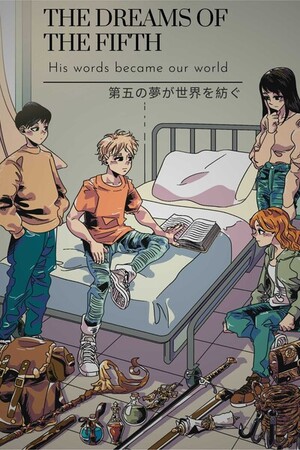Chapter 26:
Beneath a plan
The Dreams Of The Fifth - His words Became our world
Morning came without warmth. The village wore the colour of ash, its edges blurred by mist, its green scarred with prints of boots and blood. The night’s battle had left the air heavy, as if the smoke still hung despite the clear sky. Roofs smouldered where thatch had burnt, chimneys coughed pale trails, and the lanes were littered with husks of broken tools, pots cracked where they had been thrown in desperation. Fences leaned, stakes splintered, and a cart lay half turned in the ditch, its wheel sheared clean through by a blade. Yet already there was movement—the stubborn rhythm of survival. Men hammered new boards across doors, women patched rooflines with straw dragged from half-burnt barns, and children carried buckets back and forth, their steps too solemn for their age. A grave was dug at the edge of the green, shallow but wide enough for those who had not seen the dawn. The sound of earth striking wood rang louder than the hammers.
In the house the elder had given them, the four sat like men and women grown older overnight. The room smelt of damp and blood and the broth that had kept them through the night. Light from the shutters painted stripes across the table where their weapons rested, steel dulled with ash. Darius eased himself onto a stool and unwound the bandages around his ribs. The linen was stiff with blood, and when he pulled it free, the wound beneath was livid purple, the skin stretched taut. He did not grimace, only pressed the new cloth into place and wound it with practised hands. Hibiki leaned against the doorframe, eyes raw from sleeplessness, morning star coiled at his side. His hands never stilled, tightening the chain, loosening it, then coiling it again, the rhythm sharp as a heartbeat. Ren sat hunched forward, gauntlet lying across his knees. He traced its straps with restless fingers, each frayed edge another failure gnawing at him. Miyako crouched by the hearth, one knee bent, blade drawn across the whetstone in slow, even strokes. Sparks flared in the gloom, small and fleeting. None of them spoke. Their silence was not emptiness but a weight pressed evenly across four shoulders.
The elder entered near midday, his staff knocking once on the threshold before he stepped inside. His cloak still smelt of smoke, but his eyes were clear, steady as stone. Behind him two men dragged captives—the cultists who had not died when the night broke. Their wrists were bound with rope twisted from the village’s nets, their ankles shackled with iron rings scavenged from ploughs. Their faces were battered, blood dried at the corners of their mouths, but their eyes were calm. They knelt without being told, backs straight despite the bruises, and lowered their heads until only the crowns of their skulls caught the light. Their lips moved, but not in pleas. Whispered syllables slipped through cracked teeth, fragments of the same chant that had driven them through fire.
Darius rose, rolling his shoulders until bone popped. His shadow fell across the nearest captive. He crouched low, club balanced in one hand, his good eye fixed with the weight of a man who knew how to make silence answer. His voice was a rasp, flat and deliberate. “Where do they take them?”
The man lifted his head. His jaw was stitched at the edge, black thread tugging scars into crooked lines. His eyes were hollow but not broken. “Under,” he said, voice steady despite the blood drying at his lips. “Always under. Stone remembers. The cloth frays—we mend it. We unpick what binds.” Darius pressed a hand to the man’s shoulder, fingers sinking into bruised flesh until bone shifted beneath. “Where?”
The cultist did not cry out. His breath shuddered, but his voice did not break. “City’s belly. Beneath Lerenic. Cellars chained to cellars. Granaries rotted to veins. The white threads weave there. Humming, always humming.”
The elder’s face tightened. “There were tunnels,” he said, his voice carrying the tone of memory rather than rumour. “Old works from the time of sieges. We sealed them after the plague. Walled the mouths, bricked the shrines that sat above them. But stone cracks. Mortar fails. If these men say it lives again, I believe it.” The second captive raised his head. His mouth was split, but he smiled faintly, teeth stained red. “Plague never left,” he said, as if reciting truth. “You breathe it now, and you call it air.” His lips moved with a murmur, words drowned in the rhythm of prayer.
Darius’s hand snapped across his face, a strike sharp and efficient. Blood spattered the boards. The man blinked slowly, then whispered again, softer but steady. “Grey walks first. Black follows. White comes last. Ranks. More than you will count. And still you come.”
The elder looked at them then, eyes grave. “Grey robes in alleys, black by the river quarter—I’ve heard of such for years. White I’ve not seen, but their shadow is long. If he names the city’s belly, then that is where your missing one lies.” His gaze moved to Ren, to the gauntlet glinting dully in his lap. Ren did not look up, but his knuckles tightened around the straps until the leather creaked. The cultists were dragged out, their silence unbroken even as the villagers hauled them into shadow. Their absence left the air no lighter.
Later bread was brought, loaves still warm though their crusts cracked hard enough to break teeth. Bowls of broth followed, steam curling against the cold air. A farmer left a wedge of cheese wrapped in cloth, muttering thanks without meeting their eyes. A child crept to the doorway and set down a pebble painted red and green, darting away before anyone could speak. An old woman entered without asking, her hands already pulling needle and thread from a pouch, mending the tear in Ren’s cloak with stitches neat enough to shame armourers. No words were needed. The offerings carried more weight than speech ever could. The villagers did not simply survive—they gave, and in their giving showed trust.
The group ate in silence. Hibiki tore bread with hands still trembling, broth spilling onto the table as he drank too fast. Ren forced the cheese down, the taste waxy, his throat raw. He thought of Alice and the way she would have wrinkled her nose, teased him for brooding, and softened the silence with some quiet word. The absence at the table cut deeper than hunger. Miyako cleaned her blade with a rag, its edge already sharp, its movements measured. Darius drank slowly, letting the broth warm him, his face unchanged. When the bowls were empty, the elder laid a scrap of parchment across the table. The ink was faint, the lines crooked, but the shape of Lerenic was clear, marked with a cross at its edge. “Here,” he said. “The old granary. Sealed when I was a boy. But I would wager it breathes again.”
They leaned close. The map lay like a wound between them. Darius tapped the mark with a scarred knuckle. “We go in small. No noise. Take her; leave before the belly empties. If they spill, we’ll drown.” His tone was not suggestion but fact. Ren stared at the mark, his breath slow and heavy. The gauntlet weighed on his arm again, straps cutting into skin raw from use. He imagined Alice in those tunnels, stone pressing in, her voice cut short. He whispered only to himself: We don’t leave her. Hibiki wound the chain of his weapon tighter, metal biting into his palm until blood welled. He did not flinch. His nod was harsh and final. Miyako sharpened a second knife, the whetstone rasping slowly. Her face was unreadable, but the blade gleamed with the light of decision.
The elder filled the silence. “Three ways in. The main door—sealed, but stone breaks with enough force. A smuggler’s passage—hidden, but unsteady. And the river mouth, though it floods with the tide. Choose which blood you’ll spill for it. None are safe, but all will take you under.” His hand pressed the parchment flat, as if holding it steady could hold steady what came next.
They planned in silence. The words were few, but their bodies spoke—Darius testing the heft of his club, Hibiki pacing tight circles like a caged wolf, Ren buckling and unbuckling the gauntlet straps until his skin blistered, and Miyako laying knives in neat rows, oiling each with care. The elder watched, saying nothing more. The weight of decision was already in the room, and it did not need his voice to make it heavier.
When night came, villagers left food again, and blankets were laid over chairs. No one lingered. They gave their nods, quiet and certain, before stepping back into the dark. The elder was the last. He paused at the door, staff pressing once against the boards. His words were simple. “She is close. Strike fast, or not at all. Stone eats more than sound.”
When he was gone, the room was filled only with lamplight. Shadows stretched long across the walls, bending with the curve of weapons propped beside them. Ren sat with the gauntlet across his knees, head bowed, the metal pressing into his skin like judgement. Hibiki sat by the window, chain wound around his wrist, eyes burning. Miyako folded her knives in oiled cloth, movements precise to the last. Darius leaned back against the wall, eyes half closed, breath heavy. Alice’s place at the table was still empty, but everything they did bent toward her absence. The map remained at the centre, ink smudged where fingers had pressed too long, lines warped by the weight of hands that needed it to be true. It was more than parchment. It was the shape of what waited in the city’s belly.




Please sign in to leave a comment.